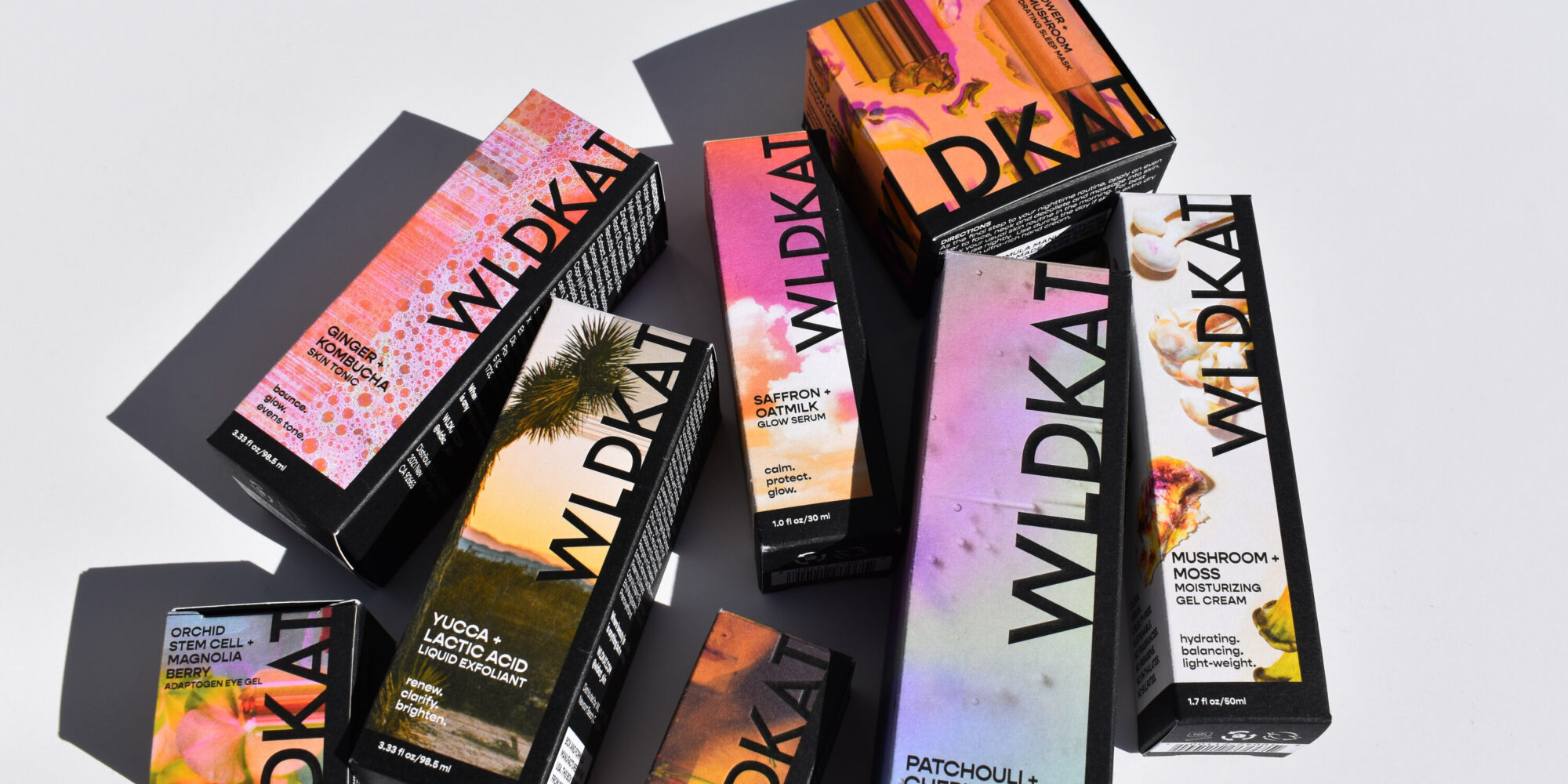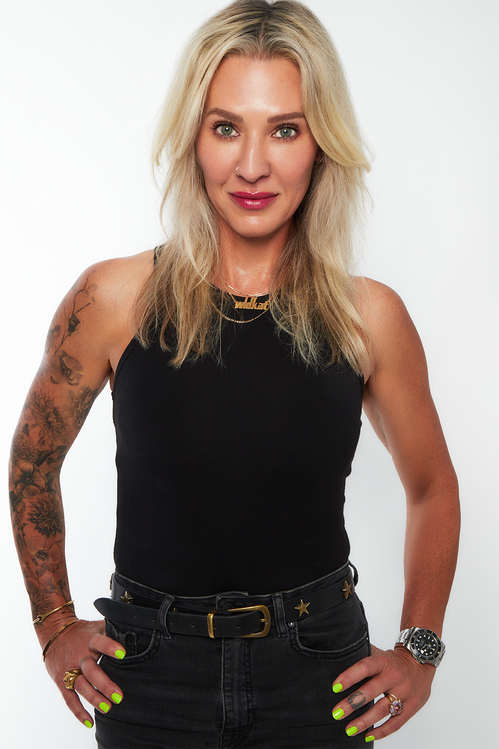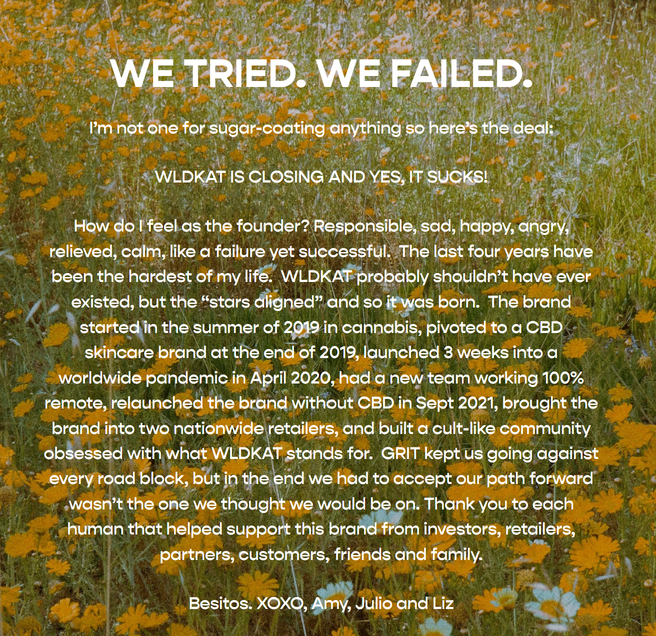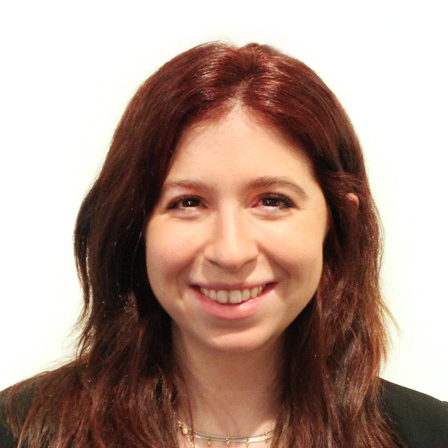
After Several Pivots, Skincare Brand WLDKAT To Shutter
WLDKAT, the clean skincare brand founded by former Urban Decay executive Amy Zunzunegui, is shutting down.
Acknowledging it might come as a shock to customers, Zunzunegui shared the news Wednesday on WLDKAT’s Instagram and TikTok accounts. The reason the brand’s closure may be a surprise is that it made visible progress in its three years on the market, securing seed funding from cannabis-centric venture capital firms and retail partnerships with Credo, Asos, Ulta Beauty, Target, Erewhon and Flip. Behind the scenes, WLDKAT’s progress encountered cash constraints that rendered it untenable.
“This is a piece of my life going away,” says Zunzunegui. “I think that was the harder part of it for me, knowing that we kind of let down the community on top of investors and retailers.”
WLDKAT’s existence was marked by pivots. Initially conceived as a cannabis lifestyle brand in 2019, it shifted its focus to CBD skincare for its launch in spring 2020. Persistent cannabis restrictions proved too challenging for Zunzunegui and Julio, her husband and business partner, to develop a broad cannabis lifestyle brand, and CBD skincare appeared to be an advantageous choice at a moment of CBD ascendance in the beauty industry.
Before retailers paused in-store shopping in the United States due to coronavirus precautions, WLDKAT had been pursuing a retail strategy and entered Credo and Asos, but the pandemic pushed it to concentrate on its direct-to-consumer channel. While DTC proved fruitful for many skincare brands amid the pandemic, WLDKAT’s position as a CBD player made it tricky. CBD brands have run into advertising and payment difficulties online.
In 2021, WLDKAT eliminated CBD from its formulas, updated its design, lowered prices, and rolled out to Ulta and Target. Its revamped formulations featured ingredients such as adaptogenic mushrooms, saffron and kombucha. Situated at first as a prestige CBD brand with prices going up to $65, WLDKAT became a masstige brand with products priced at $25 and under. Among its products are Prebiotic + Postbiotic Pleasure Serum, Ginger + Kombucha Glow Tonic, Mushroom + Moss Moisturizing Gel Cream and Patchouli + Cherimoya Gel Cleanser.

“I set WLDKAT up to have a personality, a vibe and a look that could go down multiple different paths,” says Zunzunegui. “So, it was really easy for us to rebrand what I call version 1.0, which had the CBD, and version 2.0, which you see now, and we were already working on version 3.0.”
WLDKAT weathered pivots, but not strained funding. By 2022, the brand had burned through most of its seed capital and was pursuing another fundraise. However, WLDKAT’s split from CBD alienated cannabis investors and beauty investors were skeptical about its growth trajectory.
“We came with some extra baggage that was probably hard to sift through,” says Zunzunegui. “A lot of beauty investors wanted to wait and see how we did in Ulta and Target, and you get to this mystery number of what people want you to do in revenue.”
Although WLDKAT’s sales doubled every year, its costs were spiraling out of control. Money became so tight last year that Zunzunegui and her husband paid the brand’s six full-time employees out of their own pocket. Meanwhile, they weren’t taking salaries.
“That’s when we really started to ask ourselves, ‘How much longer can we keep going here?’” says Zunzunegui. “We were getting approached to do other things where, in all honesty, we could make a very nice salary.”
Zunzunegui identifies her self-professed unwillingness to produce daily social media content to promote the brand and a remote work structure as additional contributors to WLDKAT’s troubles. “When you have really creative people at a brand like this sit behind computers in their homes on Zoom, it can’t work,” she says. “Those 20-minute coffee talks when you’re in the office or at the water cooler are absolutely critical to forming team relationships.”
In an effort to save WLDKAT, Zunzunegui searched for a celebrity ambassador that was a prerequisite to a potential deal on the table. Zunzunegui declined to name the company involved in the deal, but it evaporated once the celebrity search turned up empty. Simultaneously, Zunzunegui’s husband was diagnosed with cancer, and he and Zunzunegui determined WLDKAT must close.
“Had Amy had more access to capital options, it would’ve been a different outcome,” says Tracy Holland, founder of Goodwill Brands, a brand holding company and beauty concept accelerator, and an informal advisor to WLDKAT on funding options. “But it’s a house of cards when you’re raising capital because one opportunity is predicated on expansion of retail doors, which then is predicated upon access to capital and more liquidity.”

WLDKAT is the latest in a string of indie beauty brand closures. Lilah B, Biophile, Makeup Geek and La Bella Figura shuttered last year as the cost of doing business digitally increased and access to capital narrowed. This month, Athr Beauty and Happy 2nd Birthday revealed they’re ceasing operations as well.
Zunzunegui has already moved on to another beauty venture and is adamant she won’t found another brand anytime soon. She counsels fellow entrepreneurs to surround themselves with trusted business advisors and jump on social media early to foster a community committed to the future of their businesses.
“It is really hard to break through all of the noise now in beauty,” says Zunzunegui. “It’s expensive, and it takes a tremendous amount of energy.”





Leave a Reply
You must be logged in to post a comment.